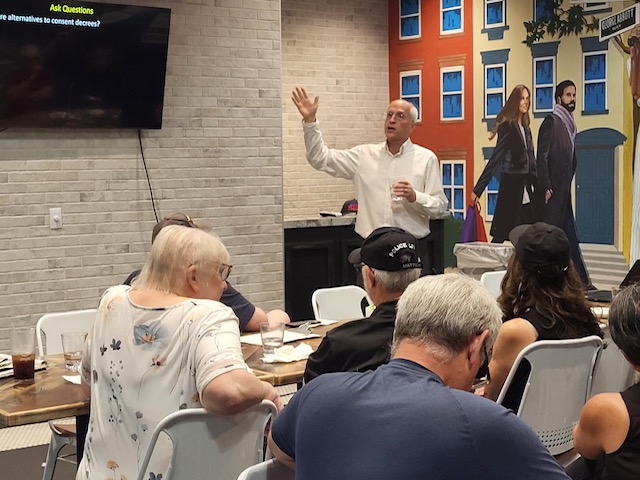PHOENIX, Ariz. – Bob Scales, a leading national voice on the pitfalls of the use of Consent Decrees by the U.S. Department of Justice to take control of local police agencies around the country, spoke to a group of concerned community members in Phoenix on Tuesday about their city’s options in facing that scenario in the near future.
Scales, an attorney who previously led the Seattle Police Department’s efforts to comply with its own DOJ Consent Decree, told attendees that his experience and research have proven that federal control of local police always leads to drastic increases in violent crime, bloated municipal budgets, and catastrophic effects on police staffing and manpower.
“There is a 30-year track record showing that this is what will happen here” in Phoenix if city leaders agree to let DOJ take control of the Phoenix Police Department with a Consent Decree, Scales warned.
DOJ’ Civil Rights Division launched an investigation of the City of Phoenix and the Phoenix Police Department on August 5, 2021, for alleged “pattern or practice” violations including discriminatory use of force and other types of unconstitutional policing. In more than two years of it’s investigation here, DOJ has never publicly acknowledged why it opened the investigation in the first place.
“In other cities, there is usually a high-profile event that causes DOJ to come to town – like in Minneapolis, Louisville or Baltimore. But that didn’t happen here in Phoenix,” Scales said, questioning the basis of DOJ’s lengthy Phoenix investigation.
Scales told attendees that the investigation will eventually result in the federal government presenting city leaders with a Consent Decree proposal, which would hand operational control of the Phoenix Police Department to a federal U.S. District Court judge, DOJ, and a for-profit monitor selected by the judge but paid for by the city.
“This would end of costing Phoenix taxpayers a quarter of billion dollars over a ten-or-more year period” with a consent decree in place, Scales said. “It’s a blank check for DOJ and they don’t pay for any of it.”
Scales noted that in other cities with such agreements, the required budget increases have led to program cuts for important city services and even tax increases.
DOJ consent decrees typically require affected cities to spend money on implementing sweeping policy changes, new equipment and technologies and other programs – regardless of whether a police department wants them.
Scales said most of those requirements have been shown by researchers to be ineffective at increasing public safety in every jurisdiction they have been implemented – and worse yet, they often cause officers to retire early or transfer to other departments unaffected by DOJ mandates.
The chilling effect on police staffing, according to Scales, directly results in increases in crime. Scales also said the DOJ policy changes overburden officers with cumbersome rules that make them less likely to effect arrests or use appropriate force on violent offenders.
Some community members voiced concerns that the Phoenix Police Department is already understaffed by 560 officers, and cannot afford the exodus in manpower predicted by Scales.
Scales responded by telling the audience that a DOJ-led takeover of Phoenix is not written in stone.
“All you need is five votes to stop it,” Scales said, noting that the governmental structure of the city – a Council-Manager system – would require the full 9-member Phoenix City Council to approve a DOJ Consent Decree before city leaders could agree to sign one. He recommended that all citizens research what has happened in cities with DOJ Consent Decrees and engage with their City Council representatives.
Scales said when DOJ finally concludes it’s Phoenix investigation, it will prepare a lengthy Findings Report for public release. He referred to DOJ’s methodology in accusing police agencies of discrimination and other violations as “unscientific”, and he suggested DOJ likely already had a pre-determined outcome planned from the beginning.
He recommended that Phoenix issue a rebuttal to the inevitable DOJ Findings Report, which would serve as the basis for the city’s defense if DOJ were to file a lawsuit to attempt to force Phoenix to adopt it’s mandates.
Scales told the audience that one local government, Alamance County in North Carolina, had previously resisted DOJ’s takeover efforts for its Sheriff’s Office and in 2015 the county defeated DOJ in federal court. If the City Council here does not approve a Consent Decree, Phoenix would be the first major city to challenge DOJ.
Over the past few years, Scales has emerged as one of the leading voices nationwide in opposing DOJ’s “pattern or practice” method of taking control of local police departments around the country.
The community event was sponsored by America Pack, an Arizona-based political action group, and attended by a number of high-profile community leaders. Officials from the Phoenix Law Enforcement Association, which represents rank-and-file Phoenix Police officers, and the Phoenix Police Sergeants and Lieutenants Association were also in attendance.





